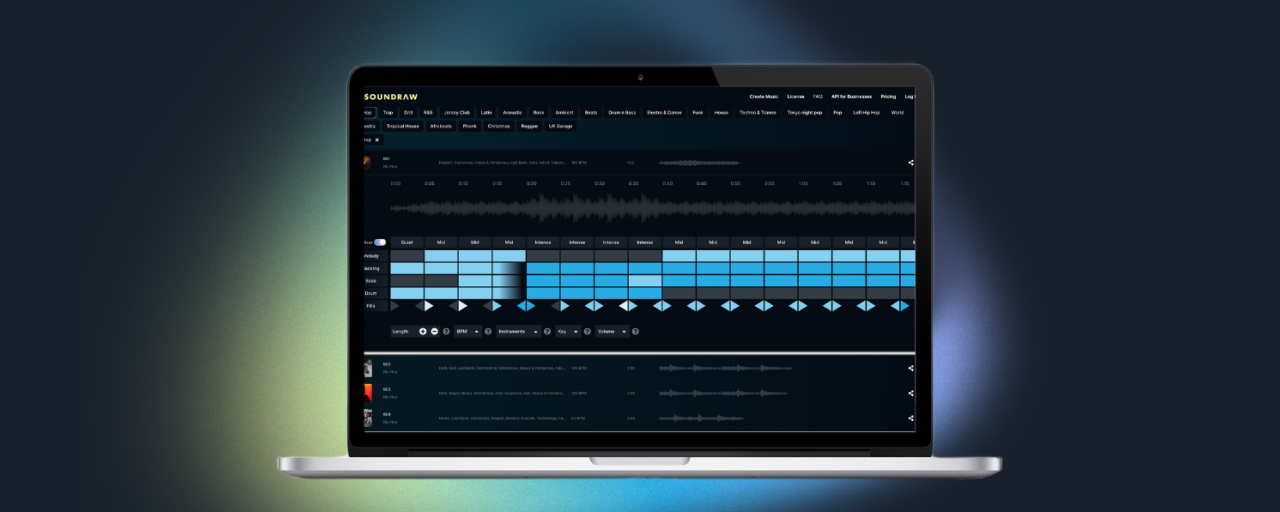We are excited to introduce you to Patrick White, known in the music world as Stoned Loner. His genre? Christian rap—a powerful and heartfelt blend of faith and music.
Patrick’s journey in music spans 15 years, during which he’s mastered everything from rapping to producing, engineering, and creating his own beats. What started as a childhood fascination with music—joining the middle school band and rapping for fun—has grown into a lifelong passion.
In this blog he tells us about his journey, his newest project "STONED" and the creative process with SOUNDRAW.
Stoned Loner's Musical Journey

I've been rapping and learning the ins and outs of the music industry for 15 years.
I’ve taught myself to create music from scratch, handling everything from beats and lyrics to production and engineering. My journey into music began when I was a kid—I joined the middle school band and started rapping as a joke, making parody songs.
But then, I realized I was actually good at it, and more importantly, I loved it. So I kept at it. I started making my own beats because I believe in teaching a man to fish; I wanted to be self-sufficient in every aspect of my music.
SOUNDRAW as a tool to share lyricism
I first heard about SOUNDRAW when I had a thought: with all this AI out there now, somebody’s probably made an AI beat machine. So, I googled it, and that’s how I found SOUNDRAW.
What attracted me to SOUNDRAW was the idea of speeding up my creative process. I love making beats, but it’s not something that comes naturally to me—it’s a skill I had to acquire.
My real talent is in words. I needed a way to get my words inside the music faster, because for me, it’s all about the message and the money. SOUNDRAW was the perfect fit for that.
Project Details - "Most High" from the album "STONED"
One specific project I worked on using SOUNDRAW was a song called “Most High.” It’s a heartfelt expression of my gratitude towards God, with no hook or chorus, just bars.
I just dropped an album called STONED, and “Most High” was the only song on it where I used AI to create the beat. It was the last song I made for the album, and it took me only five minutes to make the beat with SOUNDRAW. Every other beat on the album took at least two hours to complete, including mixing and mastering.
Musical Challenges and how to overcome them
My biggest challenge in music production is being too much of a perfectionist, which often prolongs the beat-making process.
SOUNDRAW helped me overcome this by streamlining the process, allowing me to drop songs faster and giving me more time to create freely and expressively without pressure.
Tips for Other Rappers: Use your creativity

If you’re new to SOUNDRAW, my advice is to use all 20 downloads a month, whether you need them or not.
In addition, you don’t have to use everything SOUNDRAW offers—you can take from the beats, add to them, or manipulate them to create as artistically as you want.
Your freedom to create is only limited by your own ability to think. Don’t be afraid to think outside the box; you could create unique samples from an AI composition, for example.
Suggestions for Improvement
One thing I’d love to see is SOUNDRAW adding more original music with different styles to the AI generator over time. I also imagine SOUNDRAW evolving to allow more artists to input their style into the AI, making it even more versatile for creators.
Final Thoughts
Overall, SOUNDRAW has had a significant impact on my music production. While I’ll still create my own beats at my leisure, SOUNDRAW is my go-to when I need to get my words heard quickly. I love it because I’m getting speed and quality—perfect.

.jpg)